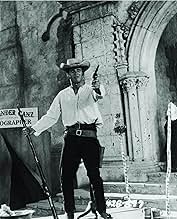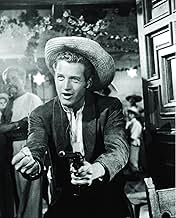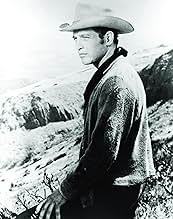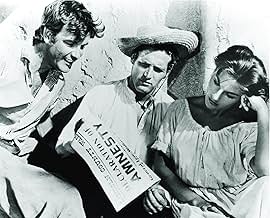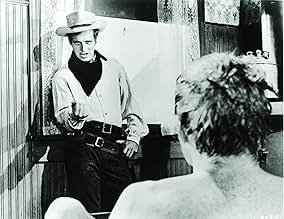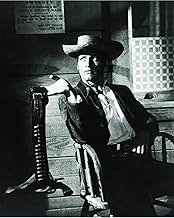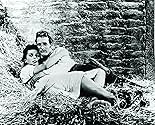CALIFICACIÓN DE IMDb
6.4/10
4.9 k
TU CALIFICACIÓN
Cuando su patrón es asesinado por un granjero rival, un joven cowboy con problemas y sin educación promete vengarse de los asesinos.Cuando su patrón es asesinado por un granjero rival, un joven cowboy con problemas y sin educación promete vengarse de los asesinos.Cuando su patrón es asesinado por un granjero rival, un joven cowboy con problemas y sin educación promete vengarse de los asesinos.
- Dirección
- Guionistas
- Elenco
- Premios
- 1 premio ganado en total
Robert Anderson
- Hill
- (as Bob Anderson)
Josephine Parra
- Bride
- (as Jo Summers)
- Dirección
- Guionistas
- Todo el elenco y el equipo
- Producción, taquilla y más en IMDbPro
Opiniones destacadas
I wonder what the mature Paul Newman thought of this early movie performance. Of course, 'mature' is a relative term since he's already 33 here, well beyond the 'kid' range. In my little book, it's the most mannered and misdirected acting of his long and distinguished career. It's almost like he's working at an excess of James Dean. That wouldn't be surprising since the screenplay's Billy comes across as more misunderstood youth than cold-blooded killer. I guess this is the first of director Penn's efforts at rehabilitating notorious American outlaws, leading up to the glossy Bonnie and Clyde (1967).
The movie itself is pretty good, the open range locations even looking like eastern New Mexico, while Penn uses them to good effect. But it's really James Best as the ill-fated henchman Tom who steals the film. His supporting role manages a certain poignancy that should have come from Billy, but doesn't. With the right breaks, I think Best could have carved a real niche in films. Speaking of supporting players, with the exception of the cartoonish Moultrie (Hatfield), they appear recruited from the many TV Westerns of the day, especially the familiar Denver Pyle and the classy John Dehner.
Penn establishes himself here as a moviemaker to watch with a number of nice touches— having Pyle squint into the sun just before the fateful moment, the lone boot left standing in the road, and others. I'm kind of sorry that the baby-faced Audie Murphy didn't get a shot at Billy's role. Visually, he's perfect. Plus, surprisingly for that boyish appearance, he could do a killer-stare to make you believe he killed 100 Germans during the war. Also, Murphy could have made that key facedown scene with Joe Bell (Pryor) as genuinely chilling as it should be. For whatever the charming Newman's considerable skills, being downright mean is not one of them. Anyway the movie remains an interesting entry on the road to 1960's-style rebellious movie-making.
The movie itself is pretty good, the open range locations even looking like eastern New Mexico, while Penn uses them to good effect. But it's really James Best as the ill-fated henchman Tom who steals the film. His supporting role manages a certain poignancy that should have come from Billy, but doesn't. With the right breaks, I think Best could have carved a real niche in films. Speaking of supporting players, with the exception of the cartoonish Moultrie (Hatfield), they appear recruited from the many TV Westerns of the day, especially the familiar Denver Pyle and the classy John Dehner.
Penn establishes himself here as a moviemaker to watch with a number of nice touches— having Pyle squint into the sun just before the fateful moment, the lone boot left standing in the road, and others. I'm kind of sorry that the baby-faced Audie Murphy didn't get a shot at Billy's role. Visually, he's perfect. Plus, surprisingly for that boyish appearance, he could do a killer-stare to make you believe he killed 100 Germans during the war. Also, Murphy could have made that key facedown scene with Joe Bell (Pryor) as genuinely chilling as it should be. For whatever the charming Newman's considerable skills, being downright mean is not one of them. Anyway the movie remains an interesting entry on the road to 1960's-style rebellious movie-making.
There have been forty-six feature films made about the life of Henry McCarty, alias William H. Bonner, alias Billy the Kid. All movies mix fact and fiction to a greater or lesser degree but one of the few sympathetic portraits of the young outlaw is Arthur Penn's 1958 film The Left-Handed Gun starring Paul Newman. Newman's Billy is a confused, emotionally unstable personality rather than a cold-blooded killer, and Penn would have us believe that Billy killed because he was forced to defend himself and his honor, not just for the thrill of it. Based on the teleplay, "The Death of Billy the Kid" by Gore Vidal, The Left-Handed Gun is a very entertaining film but feels more like a star vehicle for Newman than a film that strives to be challenging or complex. Newman captures Billy's humor and sense of fun but is too old (33) for the role and his cynical swagger seems inappropriate for the slow-witted teenager.
Billy the Kid grew up among settlers of the new towns in the American Southwest made up of cattle thieves, gamblers, and murderers. He was an illiterate drifter until John Tunstall (Keith Johnston), a friendly English rancher, took him under his wing and became a father figure. In the film, Billy becomes devoted to Tunstall (in reality Tunstall was only 24) and when the rancher is killed by a deputy and three others sent to take Tunstall's cattle and property because of his partnership with McSween in the mercantile business in Lincoln, Billy vows revenge. Together with his buddies, Tom Folliard (James Best) and Charlie Boudre (James Congdon), they track down the killers one by one until Billy is arrested and jailed by lawman Pat Garrett (John Dehner) after the last of the foursome is murdered on Garrett's wedding night. When Billy escapes from jail, killing his guards in the process, Garrett tracks him to the Chihuahuan Desert where the story of Billy the Kid's life ends and the myth begins.
Billy the Kid grew up among settlers of the new towns in the American Southwest made up of cattle thieves, gamblers, and murderers. He was an illiterate drifter until John Tunstall (Keith Johnston), a friendly English rancher, took him under his wing and became a father figure. In the film, Billy becomes devoted to Tunstall (in reality Tunstall was only 24) and when the rancher is killed by a deputy and three others sent to take Tunstall's cattle and property because of his partnership with McSween in the mercantile business in Lincoln, Billy vows revenge. Together with his buddies, Tom Folliard (James Best) and Charlie Boudre (James Congdon), they track down the killers one by one until Billy is arrested and jailed by lawman Pat Garrett (John Dehner) after the last of the foursome is murdered on Garrett's wedding night. When Billy escapes from jail, killing his guards in the process, Garrett tracks him to the Chihuahuan Desert where the story of Billy the Kid's life ends and the myth begins.
While wandering in a desert area with the saddle of his deceased horse on his back, the drifter William "Billy the Kid" Bonney (Paul Newman) stumbles with the cattle owner John "The Englishman" Tunstall (Colin Keith-Johnston) that asks him what he wants and William asks for a job. Tunstall hires him to help to bring his cattle to Lincoln to sell the herd to the army and William befriends him. However, the local Sheriff Brady (Robert Foulk) ambushes Tunstal with the rancher Morton (Robert Griffin), his Deputy Moon (Wally Brown) and Hill (Bob Anderson) and kill the cattleman to avoid the business and steal his herd. Billy the Kid promises revenge against the men and together with his friends Charlie Boudre (James Congdon) and Tom Folliard (James Best), he kills Brady and Morton. Billy hides at McSween's house that is burnt down to ashes and Billy is assumed dead by the population. He flees to Madeiro where he meets his friends Pat Garret (John Dehner), Saval (Martin Garralaga) and his daughter Celsa (Lita Milan) that loves Billy. Soon Governor Lew Wallace proclaims amnesty in the New Mexico Territory and Billy is free from any charge. However Moon and Hill are still alive and Billy still wants to revenge his friend.
"The Left Handed Gun" is a western that tells one version of the Billy the Kid story. Directed by Arthur Penn, the film is uneven, alternating good with silly moments. However, it is mandatory for fans of Paul Newman, Arthur Penn and westerns in general. My vote is seven.
Title (Brazil): "Um de Nós Morrerá" ("One of Us Will Die")
"The Left Handed Gun" is a western that tells one version of the Billy the Kid story. Directed by Arthur Penn, the film is uneven, alternating good with silly moments. However, it is mandatory for fans of Paul Newman, Arthur Penn and westerns in general. My vote is seven.
Title (Brazil): "Um de Nós Morrerá" ("One of Us Will Die")
Like the precedent user said,all that will follow in Penn's best works is already here:the search of a father,the marginal hero,incapable of becoming part of a community.In "Miracle worker", which I look upon as his masterpiece,Helen's father is thoroughly unable to communicate with his daughter who immures herself in her autism.In "the chase" Robert Redford's character has been an outcast for his whole life.In "Bonnie and Clyde" ,not only Penn depicts par excellence marginal characters but he also introduces CW Moss's character ,whose father is a mean old man,and who loves the two gangsters as his parents.
At the beginning of the movie ,Billy is still a boy searching for his identity.His boss,who reads him the Bible ("through a glass,darkly"),gives him what he's longing for.One must notice that the relationship Billy/his boss-father is too short on the screen to be really convincing.This is accentuated by the fact that the supporting cast is faceless,and once his "dad" is dead,Newman carries the movie on his own:his performance is typically "actor's studio",very deep,very introspective,in a nutshell he plays Billy as he would play a Tennesse Williams character.We're far from the western actor,such as John Wayne or Joel McCrea.The sentence "I do not want you" often comes in the lines and drives Billy to despair and violence.Actually it's the last sentence he hears from the man he loves so much.
Because they have no shoulder to lean on,Penn's heroes are doomed oedipean human beings and except for Helen in "Miracle worker",their destiny leaves them no hope.
At the beginning of the movie ,Billy is still a boy searching for his identity.His boss,who reads him the Bible ("through a glass,darkly"),gives him what he's longing for.One must notice that the relationship Billy/his boss-father is too short on the screen to be really convincing.This is accentuated by the fact that the supporting cast is faceless,and once his "dad" is dead,Newman carries the movie on his own:his performance is typically "actor's studio",very deep,very introspective,in a nutshell he plays Billy as he would play a Tennesse Williams character.We're far from the western actor,such as John Wayne or Joel McCrea.The sentence "I do not want you" often comes in the lines and drives Billy to despair and violence.Actually it's the last sentence he hears from the man he loves so much.
Because they have no shoulder to lean on,Penn's heroes are doomed oedipean human beings and except for Helen in "Miracle worker",their destiny leaves them no hope.
Based on Gore Vidal's play (which had already been filmed once for television with Newman), THE LEFT HANDED GUN is an unusual addition to the western genre, with several considerable attempts at psychoanalysis that were slightly ahead of the time for this type of picture. The film is more or less a bio of infamous outlaw Billy the Kid, with the novelty that Billy (played by Newman) is sympathetically portrayed more as a misunderstood youth rather than an outright criminal. Director Arthur Penn and screenwriter Leslie Stevens (working from Vidal's original play) have done a commendable job at presenting Vidal's revolutionist vision of Billy, even though the film sometimes rambles and lacks the streamlined momentum that made Penn's similar BONNIE AND CLYDE (1967) an American film masterpiece. The entire story was filmed much more effectively in Sam Peckinpah's cult classic PAT GARRETT & BILLY THE KID (1973), but THE LEFT HANDED GUN stands as an interesting curio and a film that (aside from some overwrought acting) has aged very well. This was yet another role that was originally intended to be played by James Dean that Newman stepped into after that young actor's tragic death. Unlike 1956's SOMEBODY UP THERE LIKES ME (which Newman played to perfection), I actually think that Dean might have actually been better suited to play Billy the Kid, as his nervy stance and cocksure demeanor have yet to be match by anyone and possibly could have enhanced the role even further. Newman is still quite good, however, playing the role as closely to Vidal's original concept as possible, and there is a particularly lovely scene with Newman's reaction as Billy to a Biblical verse remaining one of my favorite pieces of reactive acting ever. The sympathetic portrayal of Billy the Kid also gave Newman his first real shot at playing an anti-hero, a task that he would later perfect in the 24-Karat film masterpieces THE HUSTLER (1961) and HUD (1963).
¿Sabías que…?
- TriviaThe film originally was to have been made in 1956 with James Dean in the lead role.
- ErroresThe film is about western outlaw Billy the Kid, who was actually right-handed.
- ConexionesFeatured in Legends of the West (1992)
Selecciones populares
Inicia sesión para calificar y agrega a la lista de videos para obtener recomendaciones personalizadas
- How long is The Left Handed Gun?Con tecnología de Alexa
Detalles
- Fecha de lanzamiento
- País de origen
- Idiomas
- También se conoce como
- Billy the Kid
- Locaciones de filmación
- Productoras
- Ver más créditos de la compañía en IMDbPro
Taquilla
- Presupuesto
- USD 700,000 (estimado)
- Total a nivel mundial
- USD 5,066
- Tiempo de ejecución1 hora 42 minutos
- Color
- Relación de aspecto
- 1.85 : 1
Contribuir a esta página
Sugiere una edición o agrega el contenido que falta

Principales brechas de datos
What is the French language plot outline for The Left Handed Gun (1958)?
Responda

